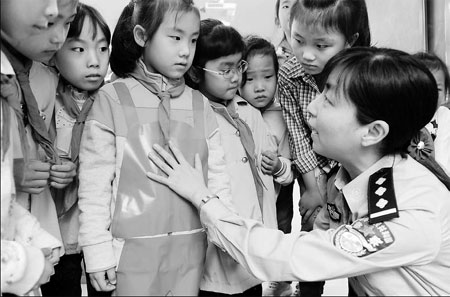Teach children to avoid abuse: experts
Updated: 2013-06-13 08:12
By Zhang Yan and Cao Yin (China Daily)
|
||||||||
|
Sun Jing, a police officer from the public security bureau of Hefei, Anhui province, talks to pupils from the city's Daoxiangcun primary school. The school invited police officers to give safety lessons on May 30. Liu Junxi / Xinhua |
Beijing judges have seen a rise in child sex abuse cases, and the victims are getting younger.
Chaoyang District People's Court in the capital has handled an average of 10 cases a year in the past three years, involving a total of 32 victims.
Most were younger than 10, while the youngest was 3 years old.
The court handled only 20 of such cases from 2007 to 2010.
"Most victims were the children of migrant workers, about 70 percent," said Zhang Yan, deputy director of juvenile tribunals for Chaoyang district court.
Most convicted defendants were men older than 40 and with families, records show.
Prosecutors for the capital's Xicheng district have tried 22 cases since 2010, involving 28 victims. Seventeen were younger than 14 years old, and 11 were younger than 10.
"Minors are vulnerable and easily become targets," said Liu Qing, a senior Xicheng prosecutor. He said victims usually knew their abusers, such as neighbors, family friends or stepfathers.
Many cases involved repeated abuse over a period of two or three years, said Yu Junping, a judge with Tongzhou district people's court. "Victims didn't dare tell their parents, and didn't consider reporting the abuse to police," Yu said.
Zhang Ning, a prosecutor in Chaoyang district, said collecting solid evidence is the biggest hurdle that judicial authorities face in child sex abuse investigations.
She urged parents to immediately report to police if their child is sexually assaulted, and advised people to keep calm and help children remember details, as well as hold on to clothing for forensic tests.
"It's terrible that some victim's parents seek compensation rather than report an incident to the police," Liu said, adding that the behavior can affect a judge's attitude about a victim's testimony.
To deter sexual assaults of minors, authorities have been urged to introduce tougher sentences, step up police patrols in key areas and enhance security.
However, legal experts say a lack of awareness among children, parental negligence and flawed safety systems are also at fault for the frequent cases of sexual abuse.
"In China, few parents are aware of the importance of sex education, and they just guide their children to learn early sex education when they are 14 or 15," Zhang Ning said.
Chinese schools also just have physical health classes rather than sex education courses, she said.
"Most victims lack awareness on how to protect themselves and they refuse to speak out," Zhang Ning said. "The damage is not found until their parents realize what's going on, perhaps because of unusual behavior."
She said some juveniles may not even realize they have been sexually abused, as schools and families lack sex education.
"It's urgent for adults to start teaching sex knowledge to children instead of confusing them and being too embarrassed to talk about the issue," she said, adding that parents should improve communication with their children.
Han Jingjing, a lawyer with the Beijing Youth Legal Aid and Research Center, added that some parents, particularly migrant workers, are too busy to properly protect their children.
"In some cases, parents let their children go to nearby shops or take elevators alone, which provided a chance for the accused," she said, adding that youngsters left with elderly relatives in the countryside are especially vulnerable.
Liu also criticized loopholes in school safety. "Many sexual assaults happen in classrooms and dormitories," he said. "Some even occur at a teacher's podium."
Schools are not only failing to conduct regular patrols, but also do not equip dormitories with protective measures, giving criminals opportunities to enter.
Contact the writers at zhangyan1@chinadaily.com.cn and caoyin@chinadaily.com.cn
(China Daily USA 06/13/2013 page5)

 Michelle lays roses at site along Berlin Wall
Michelle lays roses at site along Berlin Wall
 Historic space lecture in Tiangong-1 commences
Historic space lecture in Tiangong-1 commences
 'Sopranos' Star James Gandolfini dead at 51
'Sopranos' Star James Gandolfini dead at 51
 UN: Number of refugees hits 18-year high
UN: Number of refugees hits 18-year high
 Slide: Jet exercises from aircraft carrier
Slide: Jet exercises from aircraft carrier
 Talks establish fishery hotline
Talks establish fishery hotline
 Foreign buyers eye Chinese drones
Foreign buyers eye Chinese drones
 UN chief hails China's peacekeepers
UN chief hails China's peacekeepers
Most Viewed
Editor's Picks

|

|

|

|

|

|
Today's Top News
Shenzhou X astronaut gives lecture today
US told to reassess duties on Chinese paper
Chinese seek greater share of satellite market
Russia rejects Obama's nuke cut proposal
US immigration bill sees Senate breakthrough
Brazilian cities revoke fare hikes
Moody's warns on China's local govt debt
Air quality in major cities drops in May
US Weekly

|

|








